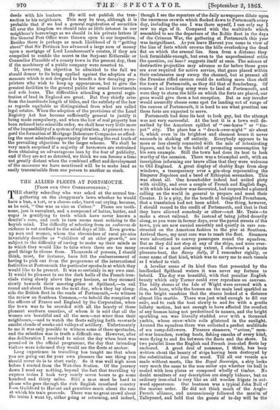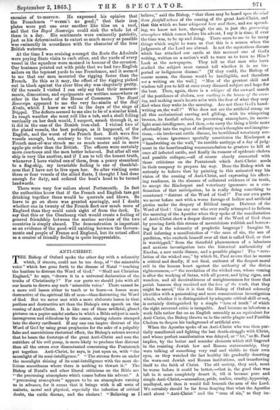T HE charity schoolboy who was asked at the annual tea-
gathering on the clergyman's lawn whether he would have a bun, a tart, or a cheese- cake, burst out crying, because, as he said, "One was as nice as t'other." Plums are tooth- some, jam is succulent, and a compound of batter, butter, and sugar is gratifying to teeth which have never known a dentist's care, and each in turn seems most enticing to the boyish mind. The difficulty of selecting from an embarras de richesses is not confined to the salad days of life. Even grown- up men and women, whom the chroniclers of rural pie-nice invariably describe as "children of an older growth," are subject to the difficulty of having to make up their minds as to which they would like to take when there are too many good things to choose from. Thousands of persons, I should think, must, for instance, have felt the embarrassment of having to pick out from the programme of the international festivities at Portsmouth the particular spectacle at which they would like to be present. It was so certainly in my own case. It would be pleasant to see the dark hulls of the French iron- dads rising slowly above the grey horizon, as they steamed slowly towards their mooring-place at Spithead,—to sail round and about them on the next day, when they lay along- side the British fleet in the roads of Portsmouth,—to witness the review on Southsea Common,—to behold the reception of the officers of France and England by the Corporation, when the town was to be crowded with all the beauty of those pleasant southern counties, of whom it is said that all the women are beautiful and all the men—not wiser than their neighbours,—and to watch the fleets sallying forth seawards amidst clouds of smoke and volleys of artillery. Unfortunately to me it was only possible to witness some of these spectacles, and the selection was in truth a difficult one. However, after due deliberation I resolved to select the day when least was promised in the official programme, the day that intending visitors were informed they would see the fleets at anchor.
Long experience in travelling has taught me that when you are going out for your own pleasure the one thing you should never do is to start early. So it was well nigh noon before I started from the Waterloo Station. Of the journey down I need say nothing, beyond the fact that travelling by express trains I took very nearly seven hours to go some hundred and thirty miles. Still a man must be hard to please who goes through the rich English moorland country from Guildford to Havant and grumbles much about the rate at which his train proceeds. There was no great crowd about the trains I went by, either going or returning, and indeed, though I see the reporters of the daily newspapers dilate upon the enormous crowds which flocked down to Portsmouth every day, including the one I was there myself, I can only say I saw no sign of it. Compared with the multitude which assembled to see the departure of the Baltic fleet in the days of the Crimean War, the gathering at Portsmouth this year was insignificant. As you leave Havant you come in view of the line of forts which crowns the hills overlooking the dead flat on which the arsenal lies. Seen from a distance they look formidable enough, but even to the unprofessional critic the question, mil bow)l suggests itself at once. The science of destructive projectiles may advance so far before these guns are ever required for active service, that guns placed within their embrasures may sweep the channel, but at present all the Prussian rifled cannon could do nothing more than shell the town of PortsmOuth, as they did that of Sonderburg. Of course if an invading army were to land at Portsmouth, and were they to storm the hills on which the forts are placed, our guns would give them a hot reception. But as any invader would assuredly choose some spot for landing out of range of the cannon of Portsmouth, it is hard to see what practical use these forts are expected to serve.
Portsmouth had done its best to look gay, but the attempt was not very successful. It the best it is a town well de- scribed by the American epithet of " one-horse " or " tin- pot " city. The place has a " drunk-over-night " air about it, which even in its brightest and cleanest hours it never succeeds in shaking off entirely. Everybody appears to be more or less closely connected with the sale of intoxicating liquors, and to be in the habit of promoting consumption by his own example. Sal the town had done its best to look worthy of the occasion. There was a triumphal arch, with an inscription informing our brave allies that they were welcome to Old England. kagreat display of shabby flags from shop windows, a transparency over a gin-shop representing the Emperor Napoleon and a band of Ethiopian serenaders. This was about all. One householder indeed had united piety with civility, and over a couple of French and English flags, with which his window was decorated, had suspended a placard calling on the world in general to prepare and meet their Creator. It is a pity, for the benefit of benighted Frenchmen, that a translation had not been added. One thing, however, I should record to the credit of Portsmouth, and that is that they have allowed somebody or other—not Mr. Train—to make a street railroad. So instead of being jolted drearily along, as you were in former days, over the paved streets of the town, you are now carried smoothly and quietly in cars con- structed on the American fashion to the pier at Southsea. Arrived there, my next care was to reach the fleet. Steamers were 'advertised to convey passengers round the squadron. But as they did not stop at any of the ships, and were over- crowded to a most alarming extent, I chartered a private pleasure-boat, the Saucy Sally, if I remember rightly, or some name of that kind, which was .to carry me to such vessels as I wished to visit.
A lovelier scene of its kind than that presented by the landlocked Spithead waters it was never my fortune to behold. The day was beautiful, with that peculiar English beauty which only Turner could ever reproduce on canvass. The hilly shores of the Isle of Wight were covered with a dim, soft haze, while the houses on the main land sparkled so in the bright sunshine that the stucco looked at a distance almost like marble. There was just wind enough to fill our sails and to rock the boat slowly to and fro with a gentle lullaby motion but not enough to have affected the comfort of any human being not predestined to nausea, and the bright sparkling sea was literally studded over with a thousand yachts, whose snow-white sails glistened in the sunlight. Around the squadron there was collected a perfect multitude of sea camp-followers. Pleasure steamers, " avisos," men- of-war launches, rowing boats, fishing smacks of every kind, were flying to and fro between the fleets and the shore. In two parallel lines the English and French iron-clad fleets lay anchored. A great deal of nonsense, I think, has been written about the beauty of ships having been destroyed by the substitution of iron for wood. Till all our vessels are made without masts, like the Royal Sovereign, a ship looks very much the same to the non sailor eye whether its hull is coated with iron plates or composed wholly of timber. No doubt monitors of any description are simply hideous, but an ordinary iron-clad is very like an old wooden frigate in out- ward appearance. Our boatman was a typical John Bull of the marine order. He did not think much of the Anglo- French alliance, and unconsciously followed the maxim of Talleyrand, and held that the guests of to-day will be the enemies of to-morrow. He expressed his opinion that the Frenchmen " weren' t no good;" that their iron plates were put one over another like tiles on a roof, and that the Royal Sovereign could sink the whole lot of them in a day. His sentiments were eminently patriotic, just as his determination to extort as much money as possible was eminently in accordance with the character of the true British waterman.
At the time I was cruising amongst the fleets the Admirals were paying State visits to each other, and the yards of every vessel in the squadron were manned in honour of the occasion. Our boatman pointed out with pride that we had two English sailors on the topmast yards to one Frenchman, and it seemed to me that our men mounted the rigging faster than the French. Be this as it may, the effect of the rigging picked out in black against the clear blue sky was singularly pretty. Of the vessels I visited I can only say that their measure- ments, dimensions, and equipments are written somewhere or other in the books of the House of Commons. The Royal Sovereign appeared to me the very fac-simile of the Rolf Irralce, which I knew so well in the days of the siege of Diippel. The defects seemed to me also to be of a similar kind. In rough weather she must roll like a tub, and a shell falling vertically on her deck would, I suspect, smash through it, as it did in the case of the Danish iron-clad. I visited two of the plated vessels, the best perhaps, as it happened, of the English, and the worst of the French fleet. Both were fine vessels enough, but, contrary to the common opinion, the French man-of-war struck me as much neater and in more apple-pie order than the British. The officers were certainly more courteous and the men better behaved. But after all one ship is very like another, and if I am to tell the honest truth, whenever I have visited one of them, from a penny steamboat to a flag-ship, my invariable feeling is one of thankful- ness that I have not to live upon her. So after visiting some three or four vessels of the allied fleets, I thought I had done enough for duty, and ordered the boat's head to be turned land wards.
There were very few sailors about Portsmouth. In fact the authorities know that if the French and English tars got drinking together there would be quarrels and blows. So leave to go on shore was granted sparingly, and I doubt whether one in twenty of the French fleet saw much more of England than they could catch sight of from the deck. To say that this or the Cherbourg visit would create a feeling of general friendship between the marine services of the two countries is simply absurd. The demonstration is important as an evidence of the good-will existing between the Govern- ments and people of France and England, but its actual effect as a creator of friendly feeling is quite inappreciable. •































 Previous page
Previous page